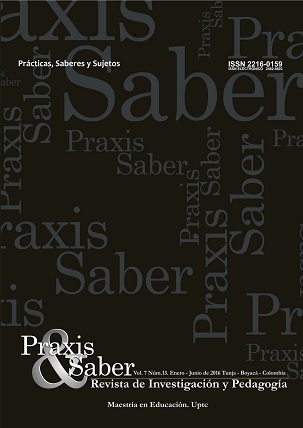Scientific spirit in early childhood

Abstract
Play and fun are key elements in the pedagogical work with five-year school children, since the teacher is required to carry out a hermeneutical and phenomenological exercise coming from the interaction among the different languages used by children to communicate their thoughts, emotions and ideas. In order to reflect about the scientific spirit in early childhood, it is necessary firstly to think about how its logic develops and operates and about the need to recognize in the sociocultural environment the possibilities to stimulate talents or the limitations demarcating their development, secondly, teaching practice must be thought in order to establish dialogue forums with students to know their needs and interests and guide their searches. To meet other is possible for children to the extent that the dialogical principle of knowledge interaction is recognized and the discovery of tensions and meeting points around the educational praxis, as an approach to infant’s rationality and his/her ways of learning, towards the social construction of boy and girl gender identity in our society.Keywords
curiosity, questions, context, teaching practice, teacher.
References
- Espinoza, A. & Vidanes, J. (1991). La nueva ordenación de la educación infantil. Madrid: Escuela Espa-ola. Congreso de la República de Colombia (2007). Ley 1098 de 2006: Código de la infancia y la adolescencia comentado y concordado.
- Freire, P. (1997). Pedagogía de la autonomía: Saberes necesarios para la práctica educativa. México: Siglo XXI Editores.
- Freire, P. (1998). La educación en la ciudad. México: Siglo XXI Editores.
- Freire, P. (2004). El grito manso. Argentina: Siglo XXI Editores.
- Freire, P. (2006). Pedagogía de la indignación. Madrid: Ediciones Morata.
- Giroux, H. (1998). Las políticas de educación y de cultura. Madrid: Ni-o y Dávila Editores.
- Gutiérrez, M. (2002). 'Aprendizaje de valores sociales a través del juego'. MORENO, J. A. [ed.] Aprendizaje a Través del Juego (51-65). Málaga, Espa-a: Ediciones Aljibe.
- Lucio, R. (1989). Educación y pedagogía, ense-anza y didáctica: diferencias y relaciones. Revista de la Universidad de La Salle [(17) 35-46].
- McLaren, P. & Giroux, H. (1998). Sociedad, cultura y educación. Madrid: Mi-ó y Dávila Editores; Instituto Paulo Freire.
- MINISTERIO DE EDUCACIÓN NACIONAL (2007). Plan Decenal de Educación 2006-2016, Capítulo II. Garantías para el cumplimiento pleno del derecho a la educación en Colombia.
- NUSSBAUM, M. C. (2012). Crear capacidades: propuesta para el desarrollo humano. Espa-a: Ediciones Paidós.
- Oliveira, I. A. (2000). O ato de perguntar na Pedagogía Freireana. Sao Paulo: Articolacao Universidad Escola.
- Restrepo, B. (2011). Investigación Acción Pedagógica. Colombia: Universidad de Antioquia, Facultad de Educación.
- Samacá-Bohórquez, I. (2011). Un rastro en el vuelo del aprendizaje con los ni-os y las ni-as [Tesis inédita de Maestría en Educación]. Tunja, Colombia: Universidad Pedagógica y Tecnológica de Colombia.
- TORRES, A. (2007). 'El décimo aniversario de la muerte de Paulo Freire'. Educación de adultos y desarrollo, Dvv Internacional (69). Recuperado el 13 de octubre de 2014 de http://www.iiz-dvv.de/index.php?article_id=279&clang=3
Downloads
Download data is not yet available.